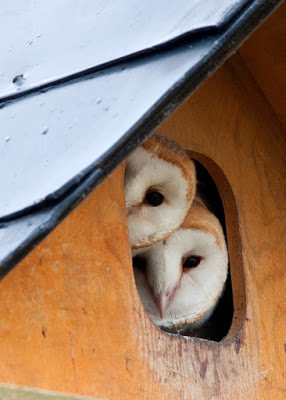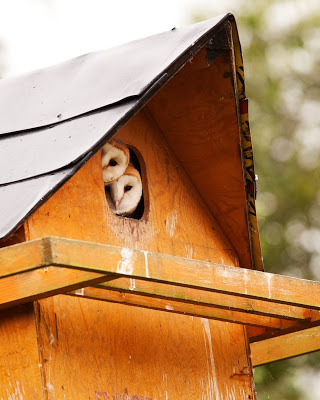Biodiversity projects can enhance employee and community engagement
These beautiful Barn Owls are part of a major success story in Co. Kilkenny that was sponsored by Veolia. Three years ago, Veolia funded a biodiversity project following a recommendation from an employee. It involved the erection of a nest box for Barn Owls, which are endangered in Ireland. There are thought to be fewer than 300 breeding pairs in the whole country and their decline has been largely attributed to homelessness, hunger and poisoning. This summer, against all the odds, the box was taken up by a pair of owls who proceeded to breed three healthy owlets – a large clutch by Barn Owl standards.
The good news was shared among Veolia employees. The company’s involvement was also noted in the local community, in two articles in a local newspaper and its actions were praised by the local authority wildlife ranger. This, plus conserving a magnificent bird that is on the ‘Red List’ in Ireland and a species of conservation concern, was achieved with a small one-off donation.
In June, BITCI delivered a biodiversity workshop in which we set out the business case for nature to a group of 30+ members. We explained how biodiversity – the variety of life on earth – is fundamental to the provision of oxygenated air, clean water, food, energy, fibre, health and wellbeing.
Often referred to as the ‘cornerstone of sustainable development’, biodiversity sits at either end of the linear production model: on one side supplying many of the raw materials we use in business (e.g. water, textiles, wood products, food and other raw materials), while simultaneously cleaning up the wastes we produce on the other (e.g. wetlands cleaning water, forests cleaning air, plants cleaning soils).
It sounds obvious, but if we want to use biodiversity’s services then we need to keep it healthy. One way of doing that is by providing homes for species like Barn Owls which, as top predators, are indicators of the health of the web of life below them.
Unfortunately, biodiversity is declining globally and in Ireland. This decline presents significant risks to the business community (regulatory, reputational, operational and supply chain risks), and many are waking up to the need to do something about it: at the international level the challenge is being addressed by teams of economists and accountants working alongside ecologists in organisations such as the World Business Council for Sustainable Development and the Natural Capital Coalition, as well as at the EU and the UN, and by a handful of progressive corporations. Accounting for natural capital – which involves accounting for biodiversity, along with other natural assets – will become business-as-usual in the coming years.
In the meantime, BITCI is working to support Irish business to understand biodiversity’s impact on the bottom line. Just as the business perspective on employees has shifted from 20th Century notions of ‘labour’ to the more holistic ‘human capital’, nature is currently undergoing a similar process by being reframed as an asset rather than a cost.
This reframing can happen anywhere in a business, from implementing environmental profit and loss accounting in the boardroom to planting wildflowers around the car park or, as we’ve heard, by funding the erection of a nest box in a local nature reserve. A variety of pathways exist through which any company – green space or no green space – can engage with biodiversity and in doing so deliver positive business impacts with employees, with the local community, with customers and suppliers, as well as in the environment.
For more information on how to integrate biodiversity into your CSR practices
please contact Hannah Hamilton hhamilton@bitc.ie.




